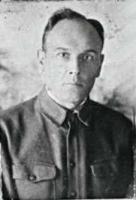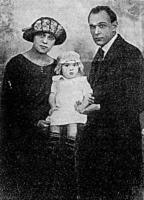Klym Polishchuk
Klym Lavrentiyovych Polishchuk (November 25, 1891 – November 3, 1937) – Ukrainian writer.
Very little is known about his biography and the available data are contradictory.
K. P. was born in a poor peasant family in the village (now Berdychiv District, Zhytomyr Region). Nothing is known about his primary education, probably none at all. He was taught by his father, after whose death Klym went to hire. The boy developed a love for books and drawing early.
Before the beginning of the First World War, K. P. stayed in his native Zhytomyr region (or more broadly, in the Volyn province). During the war, he was drafted into the army and in 1917 he ended up in the Baltic States, on the Northern Front. In 1917-1919 he was mainly in Kyiv, retreated from it together with the army of the Ukrainian People’s Republic and together with it moved to the territory controlled by Poland. K. P. was interned together with Ukrainian soldiers, but was soon released from the camp and lived in different sites of Galicia, which was occupied by Poland.
In 1921, Klym Polishchuk married Halyna Mnevska (1895 – 1955), who was originally from Poltava region and also ended up in Galicia. In 1922, they had a daughter Lesja (1922 – 1971). Galina was a theater actress and writer (published under the pseudonym Halyna Orlivna). At the end of 1925, not without the influence of his wife, he and his family moved to Soviet Ukraine, to Kharkiv.
He managed to hold out for four whole years under Soviet rule – only at the end of 1929, the criminal Moscow occupation authorities arrested him and sentenced him to 10 years in the camps. He was imprisoned first somewhere in the Arkhangelsk region, then in the north of Kazakhstan (Karaganda), and then in the Solovetskyi camp. From there, together with a thousand or so other prisoners, he was taken to the Sandarmokh area (on the northern shore of Lake Onega between Povenets and Medvezhohirsk) and shot on November 3, 1937.
K. Polishchuk was rehabilitated already after the fall of the criminal Moscow government in Ukraine – on April 14, 1992, by the decision of the Kharkiv Regional Prosecutor’s Office.
The stages of K. P.’s literary work are generally determined by the milestones of his biography. His first works were written and some were even printed as separate books even before the beginning of the First World War. Participation in the war gave him a significant supply of new observations on life, which were reflected in the works written during the several years after the war.
In 1917-1919, K. P., while in Kyiv, took an active part in the literary life of the capital of revived Ukraine. At this time, new collections of his poems and short stories are published, which attract the attention of reviewers (mostly negative).
The most fruitful period in K. P.’s life was his stay in Galicia, where several collections of his short stories and two novels were written and published in separate editions. His two other novels, already announced by the publishing house, were not published for unknown reasons.
Attempts to continue creative work under the rule of the Moscow Bolsheviks were not successful for K. P. There were no separate editions of his new works, as well as reprints of what was written earlier. At that time, K. P. wrote and published only a few short stories in various magazines (mostly little known; the last publications date back to 1927).
In the terrible conditions of imprisonment, K. P. tried to continue his writing work. From the works of this period, only his memories of Anna Barvinok have preserved. The rest of the works, which he mentioned in the letters, have not been discovered and probably perished irretrievably.
The repression to which K. Polishchuk was subjected erased him not only from life, but also from literature. Only in 1991 the novel "Gulaypilskyi "father" was republished, and in 2008 – the volume "Selected Works" was issued. Our e-reprint is currently the most complete collection of Klym Polishchuk’s literary heritage, however, it is far from complete.
The only known photo of K. Polishchuk that we provide is : "To my sweet daughter Lesja on "don’t forget". Dad Klym. 12 / X 1932, Karaganda".
The photo of K. Polishchuk with his family was taken from . We tentatively date it to 1923 based on the possible age of the child.
M. Zh., February 17, 2023


